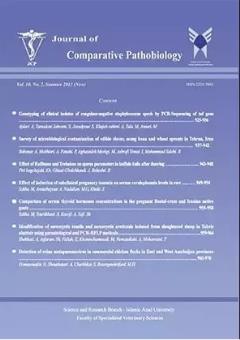Protective effect of ginger extract in male Wistar rats fed a high-fat diet
Subject Areas :Meysam Karbasian 1 , Negar Panahi 2 * , Reza Badalzadeh 3 , Hamed Beheshti 4 , Delavar Shahbazzadeh 5
1 -
2 - Department of Basic Sciences, Faculty of Specialized Veterinary Sciences, Science and Research Branch, Islamic Azad University, Tehran, Iran.
3 - Department of Basic Sciences, Tabriz University of Medical Sciences, Tabriz, Iran
4 - Department of Patobiology, Karaj Branch, Islamic Azad University, Tehran, Iran.
5 - Department of Biotechnology and venom, Pasteur Institute
Keywords: Ginger extract, Carbohydrate-rich diet, Insulin, HOMA-IR,
Abstract :
In recent years, the consumption of unhealthy, high-fat, and high-carbohydrate foods has led to an increase in obesity metabolic disorders, and cardiovascular diseases. This study aimed to investigate the effect of orally administering a ginger extract on serum lipid profiles, obesity factors, and cortisol and testosterone hormones in obese rats induced by a high-carbohydrate and high-fat diet. Twenty-one rats were divided into three groups. The first group was given a standard rat diet, the second group received a high-fat diet over 12 weeks, and the third group received a high-fat diet for 12 weeks with daily administration of ginger extract (100 mg) for six weeks. The intake of food and water, as well as weight gain, were measured. Additionally, plasma glucose, lipid profiles, and serum hormone levels were assessed biochemically. The results showed that the administration of ginger extract led to decreased food intake, weight gain, glucose level, insulin level, and Homeostatic Model Assessment for Insulin Resistance (HOMA-IR) compared to obese rats receiving a high-carbohydrate diet. Furthermore, cortisol levels remained unchanged in the supplement-receiving group, and the increased testosterone in the test rat showed a significant difference compared to the control rat. This study confirms that ginger extract could combat obesity and related health problems by influencing metabolic processes and hormone levels, thus helping to prevent the adverse effects of a high-carbohydrate diet.
1. Loos RJ, Yeo GS. The genetics of obesity: from discovery to biology. Nature Reviews Genetics. 2022;23(2):120-33.
2. Kojta I, Chacińska M, Błachnio-Zabielska A. Obesity, bioactive lipids, and adipose tissue inflammation in insulin resistance. Nutrients. 2020;12(5):1305.
3. Sarma S, Sockalingam S, Dash S. Obesity as a multisystem disease: Trends in obesity rates and obesity‐related complications. Diabetes, Obesity and Metabolism. 2021;23:3-16.
4. Zhang M, Zhao R, Wang D, Wang L, Zhang Q, Wei S, et al. Ginger (Zingiber officinale Rosc.) and its bioactive components are potential resources for health beneficial agents. Phytotherapy Research. 2021;35(2):711-42.
5. Talebi M, Ilgün S, Ebrahimi V, Talebi M, Farkhondeh T, Ebrahimi H, Samarghandian S. Zingiber officinale ameliorates Alzheimer’s disease and cognitive impairments: lessons from preclinical studies. Biomedicine & Pharmacotherapy. 2021;133:111088.
6. Akomolafe SF, Oriyomi IA. Effect of ginger (Zingiber officinale roscoe) inclusisve diet on testicular disorder in high cholesterol diet-induced obese rats: Involvement of cholesterol pathway. Phytomedicine Plus. 2024;4(4):100618.
7. Zhang S, Kou X, Zhao H, Mak K-K, Balijepalli MK, Pichika MR. Zingiber officinale var. rubrum: Red ginger’s medicinal uses. Molecules. 2022;27(3):775.
8. Karbasian M, Panahi N, Badalzadeh R, Beheshtiha SHS, Shahbazzade D. Regulation of Neuropeptide Y Receptor Gene Expression and Hormone Level in Obese Male Rats Receiving 6-Gingerol and L-Arginine Supplementation. Archives of Razi Institute. 2024;79(1):185-93.
9. Shalaby M, Hamowieh A. Safety and efficacy of Zingiber officinale roots on fertility of male diabetic rats. Food and Chemical Toxicology. 2010;48(10):2920-4.
10. Haridas M, Sasidhar V, Nath P, Abhithaj J, Sabu A, Rammanohar P. Compounds of Citrus medica and Zingiber officinale for COVID-19 inhibition: in silico evidence for cues from Ayurveda. Future Journal of Pharmaceutical Sciences. 2021;7(1):1-9.
11. Yousfi F, Abrigach F, Petrovic J, Sokovic M, Ramdani M. Phytochemical screening and evaluation of the antioxidant and antibacterial potential of Zingiber officinale extracts. South African Journal of Botany. 2021;142:433-40.
12. Raafat M, El-Sayed AS, El-Sayed MT. Biosynthesis and anti-mycotoxigenic activity of Zingiber officinale roscoe-derived metal nanoparticles. Molecules. 2021;26(8):2290.
13. Fazakerley DJ, Krycer JR, Kearney AL, Hocking SL, James DE. Muscle and adipose tissue insulin resistance: malady without mechanism? Journal of Lipid Research. 2019;60(10):1720-32.
14. Keaver L, Xu B, Jaccard A, Webber L. Morbid obesity in the UK: A modelling projection study to 2035. Scandinavian Journal of Public Health. 2020;48(4):422-7.
15. Lin H, An Y, Tang H, Wang Y. Alterations of bile acids and gut microbiota in obesity induced by high fat diet in rat model. Journal of Agricultural and Food Chemistry. 2019;67(13):3624-32.
16. Ghlissi Z, Atheymen R, Boujbiha MA, Sahnoun Z, Makni Ayedi F, Zeghal K, et al. Antioxidant and androgenic effects of dietary ginger on reproductive function of male diabetic rats. International Journal of Food Sciences and Nutrition. 2013;64(8):974-8.
17. Naidu PB, Uddandrao VS, Naik RR, Suresh P, Meriga B, Begum MS, et al. Ameliorative potential of gingerol:
Promising modulation of inflammatory factors and lipid marker enzymes expressions in HFD induced obesity in rats. Molecular and cellular endocrinology. 2016;419:139-47.
18. Shalaby MA, Saifan HY. Some pharmacological effects of cinnamon and ginger herbs in obese diabetic rats. Journal of Intercultural Ethnopharmacology. 2014;3(4):144.
19. Akinyemi AJ, Adedara IA, Thome GR, Morsch VM, Rovani MT, Mujica LKS, et al. Dietary supplementation of ginger and turmeric improves reproductive function in hypertensive male rats. Toxicology Reports. 2015;2:1357-66.
20. Isa Y, Miyakawa Y, Yanagisawa M, Goto T, Kang M-S, Kawada T, et al. 6-Shogaol and 6-gingerol, the pungent of ginger, inhibit TNF-α mediated downregulation of adiponectin expression via different mechanisms in 3T3-L1 adipocytes. Biochemical and Biophysical Research Communications. 2008;373(3):429-34.
21. Mazidi M, Gao H-K, Rezaie P, Ferns GA. The effect of ginger supplementation on serum C-reactive protein, lipid profile and glycaemia: a systematic review and meta-analysis. Food & Nutrition Research. 2016;60(1):32613.
22. de Las Heras N, Valero-Muñoz M, Martín-Fernández B, Ballesteros S, López-Farré A, Ruiz-Roso B, Lahera V. Molecular factors involved in the hypolipidemic-and insulin-sensitizing effects of a ginger (Zingiber officinale Roscoe) extract in rats fed a high-fat diet. Applied Physiology, Nutrition, and Metabolism. 2017;42(2):209-15.

